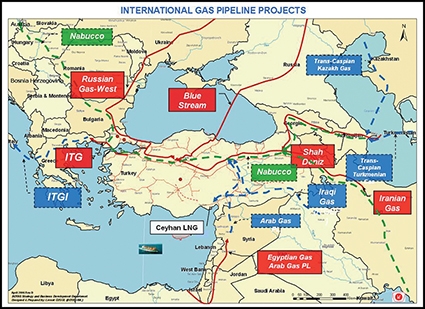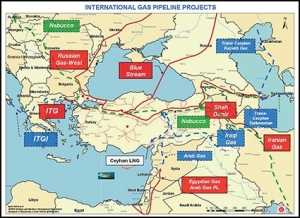Turkey - A Strategic Energy Hub
The US, which in the global energy strategy always claims its rights and puts energy first place in its foreign policy, presents itself as the largest oil producer in the world with production of more than 15 million barrels a day. Saudi Arabia comes in at second place with 12 million barrels, Russia with over 11 million. China, at 4.7 million barrels a day, is fourth in line, after which begins another league of states in which Canada, with 4.5 million, ranks fifth, and Iraq, extracting more than four million – holds sixth place. Turkey, with the production of 63 thousand barrels per day, is located in 59th place after Bahrain.
In a US Energy Information Administration publication dated February 2, Turkey's Energy Information Administration claims that today Turkey has reserves of 312 million barrels, a daily production of 85 thousand barrels in 2004 after a low in 1991 of just 43 thousand.
The Turkish state-owned oil company is a major player in the sector, which counts approximately 72% of daily production.
Crude oil production in Turkey provides 7% of its needs. The report notes that in the near future, Turkey may make significant investments in drilling oil and gas wells in the Black Sea and Aegean regions. With steady growth of the Turkish economy in the period 2003 to 2016, daily production was no less than 700 thousand barrels in 2006, which rose to 860 thousand barrels at the end of 2015; 41% of imports of crude oil comes from Iraq, Turkey carries 20% - from Iran, 11% - from Russia, and 9% - from Saudi Arabia.
Most important is the role of Turkey as an "energy crossroads," one of the most unique in the world. With the help of tankers through the Bosporus and Dardanelles, more than two million barrels of Caspian and Russian crude oil are carried per day. The Baku - Tbilisi – Ceyhan pipeline pumps 1.2 million barrels, as well as the Kirkuk - Yumurtalik and Erbil – Ceyhan pipelines with a capacity of 1.5 million and 700 thousand, respectively. About 5% of global oil production runs through Turkey.
The report of the US Energy Information Administration indicates that Turkey is an important energy hub in continental Europe and the Atlantic markets. Continental Europe is the second largest in the world in natural gas consumption and Turkey is vital to the energy potential of the Caspian Sea, the Middle East, and Russia, in terms of providing access to the most important markets.
In 2015, Turkey satisfied 99% of its natural gas needs by imports. 83% of its daily requirement is provided by the pipelines, 1% by domestic production and 16% by liquefied natural gas. The most important supplier of gas to Turkey is Russia. For Russia, Turkey is the second most important market after Germany.
Dimitri Dolaberidze











